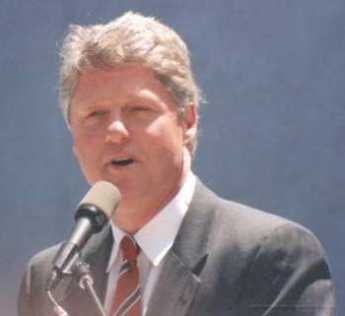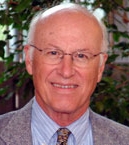Related Topics
Philadelphia Medicine
The first hospital, the first medical school, the first medical society, and abundant Civil War casualties, all combined to establish the most important medical center in the country. It's still the second largest industry in the city.
Medical Economics
Some Philadelphia physicians are contributors to current national debates on the financing of medical care.
Insurance in Philadelphia
Early Philadelphia took a lead in insurance innovation. Some ideas, like life insurance, flourished. Others have faded.
A New Gorilla in the Cage

|
| William Clinton |
News reports began to surface that big business was talking to Democrats in the White House about major revisions in the national health delivery system. That in itself was news, because big business normally forbids its employees to talk with regulators, and does not commonly welcome any new regulations. But the Clinton Administration was looking for political allies, while the business community was willing to examine proposals to lighten the burden of employer-based health insurance. The discussions soon probed whether a common system might reduce government costs of Medicare and Medicaid, and simultaneously reduce the costs of employer-paid health insurance. For years, big business had been suspicious that the health community had somehow forced employers to pay an unfairly large share of other people's health costs, through some arcane manipulation of hospital cost accounting. Their term was cost shifting.
The administrators of government programs believed the same thing was happening to them. Since the only group left to benefit were uninsured, the arithmetic was somehow wrong. A 7% population group, most of whom are young and healthy, could not account for annual premium jumps far in excess of the cost of living, occasionally as much as 30% in one year. In both governmental and business minds, the main beneficiaries of cost-shifting must be the hospitals themselves, and the doctors who control them. Somehow, it seems not to have occurred to them that this news was brought to them by their fiscal agents, the health insurance companies, and was therefore likely slanted to avoid attention to middle-man costs. Whenever major negotiations are to be held, CEOs and top politicians take over to make the deals, necessarily basing their judgments on filtered information. Since this is a familiar situation, they employ high-priced consultants.

|
| Clark Havighurst |
The five hundred secret members of Mrs. Clinton's task force were willing to listen to the ideas of anyone who had political clout, especially staff members of Congressional committee chairmen. But these people had been struggling with the problem for fifty years to no avail, so the emphasis had to be on change, on big new ideas. Universities and think tanks were especially welcome to comment, and
Clark Havighurst was particularly influential. But there had to be some kind of track record, some practical experience on which to base such an enormous national initiative. The best available model was the Health Maintenance Organization (HMO), whose most famous proponent was Paul Ellwood, a former midwestern pediatric neurologist who had gravitated into health insurance consulting. Ellwood had a vacation home in Jackson Hole, Wyoming, where he then gathered the non-government component of this movement into his front parlor. Insurance companies, human resources officials, academics, and in later stages the news media, were given the Word, an opportunity to criticize, and an opportunity to have their views coordinated with the government group in Washington. There was a rough division of labor, establishing general regions of dominance; but ultimately, the two components intended to fit together in a unified health system for the whole country, bar none. The business community began to see that inevitably, in that case, the final overarching decisions would be made in Congress.
Originally published: Wednesday, July 11, 2007; most-recently modified: Sunday, July 21, 2019